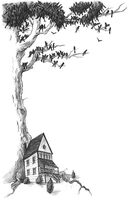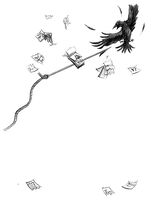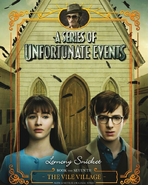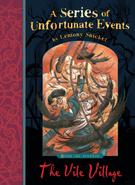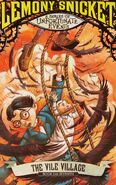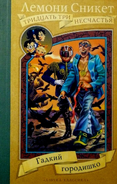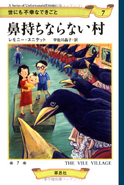No edit summary |
No edit summary |
||
| Line 11: | Line 11: | ||
|exlibris = '''Top:''' [[Baudelaire children]]<br/>'''Bottom:''' Detective Dupin |
|exlibris = '''Top:''' [[Baudelaire children]]<br/>'''Bottom:''' Detective Dupin |
||
|guardian = [[Village of Fowl Devotees]] |
|guardian = [[Village of Fowl Devotees]] |
||
| − | |library = Hector's |
+ | |library = Hector's secret library in his [[Hector's barn|barn]] |
|odisguise = [[Detective Dupin]] |
|odisguise = [[Detective Dupin]] |
||
|finalimage = Klaus is seen picking up notes of the Quagmire's and Violet and Sunny are in the background, a magazine labeled "Last Chance". |
|finalimage = Klaus is seen picking up notes of the Quagmire's and Violet and Sunny are in the background, a magazine labeled "Last Chance". |
||
Revision as of 17:16, 29 June 2018
- You may be looking for The Vile Village: Part One or Part Two.
The Vile Village is the seventh book in A Series of Unfortunate Events, written by Lemony Snicket (Daniel Handler).
The book was later adapted into the TV series produced by Netflix as the fifth and sixth episodes of season 2.
In this book, the Baudelaires are sent to live with an insane village obsessed with crows, governed by power-hungry seniors who enact hundreds of ridiculous rules, even threatening to burn citizens at the stake for absurd reasons like putting more than fifteen pieces of nuts on a hot fudge sundae.
This book is considered to be the "plot twist" of the series because the Baudelaires can no longer call on Mr. Poe for assistance after the events of this book (although he was barely any help to begin with), and the children are deemed "criminals." Also, after this point, the Baudelaires are not assigned any legal guardians.
Dear Reader
Dear Reader,
You have undoubtedly picked up this book by mistake, so please put it down. Nobody in their right mind would read this particular book about the lives of Violet, Klaus, and Sunny Baudelaire on purpose, because each dismal moment of their stay in the village of V.F.D. has been faithfully and dreadfully recorded in these pages.
I can think of no single reason why anyone would want to open a book containing such unpleasant matters as migrating crows, an angry mob, a newspaper headline, the arrest of innocent people, the Deluxe Cell, and some very strange hats.
It is my solemn and sacred occupation to research each detail of the Baudelaire children's lives and write them all down, but you may prefer to do some other solemn and sacred thing, such as reading another book instead.
With all due respect,
![]()
Lemony Snicket
Dedication
- For Beatrice–
- When we were together I felt breathless.
- Now, you are.
Plot
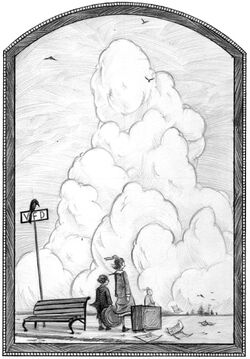
The Baudelaires on their walk to V.F.D.
Violet, Klaus, and Sunny Baudelaire are in Mr. Poe's office, looking at The Daily Punctilio (a newspaper full of lies about the Quagmires, Baudelaires and Count Olaf). Mr. Poe gives a brochure to the Baudelaires because a new program allows an entire village to serve as guardian. The children naturally choose V.F.D. as they recognize the acronym which Duncan and Isadora Quagmire had previously discovered is part of a terrible secret somehow related to Count Olaf.
The children depart for the unknown V.F.D. by bus and after a long, hot and dusty walk from the bus stop, they reach the town of V.F.D. which is filled with crows. They become acquainted with the Council of Elders, who proclaims that the children will do all the chores for the entire village, but they will be living with Hector, the handyman. There is also a new Chief of Police, a female officer named Officer Luciana.
Hector takes them to his home, where he shows them the house, the barn, and the Nevermore Tree, where all the crows come to roost at night. The Baudelaires learn that V.F.D. stands for the Village of Fowl Devotees. Hector shows the Baudelaires the following couplet, which he says was found at the base of Nevermore Tree:
- For sapphires we are held in here,
- Only you can end our fear.
The Baudelaires discover that Hector has been breaking the incredibly strict and unfair town rules by keeping a secret library and working on a hot-air mobile home in his barn so that he can sail away from V.F.D. forever. They discuss the Quagmires and consider the fact that Isadora might be somehow sending the Baudelaires a plea for help in the poem. They also discover a new couplet under the tree, though they've kept the tree under surveillance the whole night, which reads:
- Until dawn comes we cannot speak,
- No words can come from this sad beak.
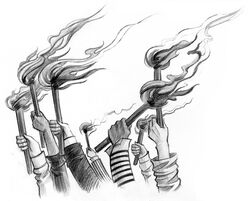
The villagers desire to burn "Count Omar" to death.
Three members of the Council of Elders come and report that Count Olaf has been captured, and the Baudelaires are to report immediately to the Town Hall. The Baudelaires discover that Count Olaf was not captured but instead, a man named Jacques Snicket was captured. Jacques also has one eyebrow and a tattoo of an eye on his ankle. The children insist that he is not Count Olaf, but the townspeople do not listen to them. The next day the villagers plan to burn him at the stake.
That night the Baudelaires construct a plan. Sunny keeps watch at Nevermore Tree to see where the poems are coming from. Klaus searches the rules of V.F.D. for something to help Jacques out of trouble. Violet helps finish Hector's hot-air balloon device that would be a useful escape device if Count Olaf comes after them.
Violet fixes the hot air balloon. Klaus discovers that a rule allows the accused to make a speech explaining himself. If a few people say something, mob psychology can make everyone demand the same thing and thus they can suggest that they release Jacques. Sunny discovers that the crows are somehow delivering the couplets and finds a new one:
- The first thing you read contains the clue,
- An initial way to speak to you.
When the children run to the uptown jail where Jacques is being held, they learn that he is dead. V.F.D.'s police officer, Luciana announces that Jacques (as Count Olaf) has been murdered in the night, and Olaf, masquerading as Detective Dupin, accuses the Baudelaires of murdering "Count Olaf." He claims that Violet's hair ribbon and a lens from Klaus's glasses were found on the scene, and Sunny's teeth marks are on the body. The people ignore the fact that the orphans have solid alibis and the children are quickly locked up inside the Deluxe Cell in the prison. Villagers plan to burn them at the stake the following day. Detective Dupin tells the children that one of them will make a great escape before the burning, making it possible for him to inherit the Baudelaire fortune and he leaves them to decide who will survive.
While they are locked up, Klaus realizes that it is his 13th birthday. Officer Luciana comes in and brings them water and bread. Violet pours the pitcher of water repeatedly down a wooden bench onto the wall to soften the mortar and then squeezes the water out of the bread where it had collected at the bottom of the wall. This process, repeated all through the day, evening and following morning slowly starts to weaken the thick brick walls of the prison cell.
At daybreak, Hector comes to the window and tells them that if they manage to break out, he has the hot-air balloon ready. He also gives them the daily couplet:
- Inside these letters the eye will see,
- Nearby are your friends and V.F.D.
Running out of time, they break free of the jail using the wooden bench as a battering ram against the weakened mortar and read all the poems together using the clue An initial way to speak to you. to read the first initial of each line.
- For sapphires we are held in here.
- Only you can end our fear.
- Until dawn comes we cannot speak.
- No words can come from this sad beak.
- The first thing you read contains the clue.
- An initial way to speak to you.
- Inside these letters the eye will see.
- Nearby are your friends and V.F.D.
The Baudelaires figure out a number of things: The sapphires refer to the Quagmires' fortune. The Quagmires cannot speak until dawn as the crows do not arrive uptown until then. The initial way to speak to them is not V.F.D., but the first letter of each verse, which spells out 'fountain.' They rush over to Fowl Fountain where Sunny manages to press a secret button in the eye of the crow. It opens the beak, revealing the damp Quagmires inside.
At this point, they flee the mob that is on its way to burn them at the stake and make a run for the outskirts of town. As they go, the Quagmires explain that Count Olaf locked them in the tower of his house. Then he had his associates build the fountain and imprisoned the Quagmires. The Quagmires attached the couplet to the crows' feet every morning, which fell off in the Nevermore Tree when the paper was dry. They tell the Baudelaires that the man who died was Jacques Snicket. The mob catches up to them and they run again.
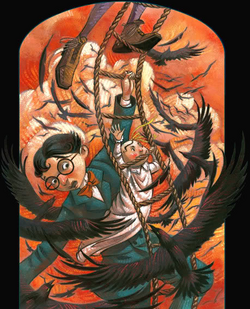
Klaus being attacked by crows as he escapes the vile village.
They reach the outskirts of town and Hector arrives in his hot-air mobile home. He throws down a rope ladder and the Quagmires start to climb up to get inside. Officer Luciana shoots at the rope ladder with a harpoon gun, breaking the rope while the Baudelaires are still climbing. They jump down to earth, saying goodbye to the Quagmires, who then throw their notebooks down to the orphans so they can read their research. A final harpoon pierces the books and scatters them as the hot-air mobile home heads towards the horizon. Though one crow got injured in the process causing the villagers to get angry with them.
The book ends with Count Olaf and Officer Luciana, who is revealed to be Esmé Squalor, escaping on a motorcycle. The Baudelaires flee rather than waiting for the police and the Daily Punctilio wrote an article reporting that they killed Count Olaf.
Characters
Introduced:
Reappearing:
- Violet Baudelaire
- Klaus Baudelaire
- Sunny Baudelaire
- Arthur Poe
- Count Olaf (as Detective Dupin)
- Esmé Squalor (as Officer Luciana)
- Duncan Quagmire
- Isadora Quagmire
Word Definitions
- At large: "Baudelaire orphans at large!" it read, using a phrase which here means "not in jail"
- Be in their element: a phrase which here means "in the sort of home the three siblings would prefer"
- Changed her tune: Sunny quickly changed her tune, a phrase which here means "immediately said 'Gounce!' instead, which meant something along the lines of 'Let's live there!'"
- Concentrated its efforts: the wind concentrated its efforts on Violet, a phrase which here means that before long her hair was so wildly tangled that it looked like it had never seen a comb.
- Depressed: is a word that often describes someone who is feeling sad and gloomy, but in this case, it describes a secret button, hidden in a crow statue, that is feeling just fine, thank you
- Fire away: Hector said, using a phrase which here means "begin telling me about your plans"
- Floated several theories: As they gathered up the hedge trimmings they floated several theories — the phrase "floated several theories" here means "talked quietly about the two couplets by Isadora Quagmire"
- Followed her gaze: Her siblings followed her gaze, a phrase which here means "also looked at the window and tried to think of something helpful."
- Gargantuan: Nevermore Tree was gargantuan, a word which here means "having attained an inordinate amount of botanical volume," a phrase which here means "it was the biggest tree the Baudelaires had ever seen."
- Hear, hear!: an expression which here means "I don't want Violet, Klaus, and Sunny Baudelaire to live with me, either!"
- Her legs gave out: Sunny shrieked, but no one heard her over Violet's scream as her legs gave out, a phrase which here means that she toppled to the ground, skinning her knee and dropping Klaus in the process.
- Horizon: here means "the boundary where the sky ends and the world begins"
- Impenetrable: Fowl Fountain looked as impenetrable — a word which here means "impossible to break into and rescue kidnapped triplets" — as it did ugly.
- In pandemonium: The room was in pandemonium, a phrase which here means "filled with Elders and townspeople standing around arguing."
- Indignantly: "Our sister didn't bite anyone to death," Violet said indignantly, a word which here means "in defense of an innocent baby."
- Intimidated: The children were not nearly as intimidated, a word which here means "made skittish by three older women wearing crow-shaped hats."
- Ordeal: "You've certainly been through an ordeal," Hector said, using a word which here means "a heap of trouble, most of which was Count Olaf's fault."
- Preamble: Klaus said without preamble, a phrase which here means "almost as soon as Hector sat down."
- Prone to error: Mr. Poe was extremely prone to error, a phrase which here means "always had a cough, and had placed the three Baudelaire children in an assortment of dangerous positions."
- Rethink: Violet took the ribbon out of her hair and then retied it, which was something she did when she needed to rethink, a word which here means "Think even harder about the Baudelaire orphans' terrible situation."
- Retrace their steps: a phrase which here means "turn around and run the other way when they saw townspeople approaching"
- Rise to the occasion: Hector did not rise to the occasion, a phrase which here means "continued to sit in his folding chair with his eyes cast downward"
- Saw them off: As Mr. Poe saw them off — a phrase which here means "put the Baudelaires on a bus, rather than doing the polite thing and taking them to their new home personally"
- Throw off all pretense: a phrase which here means "take off part of his disguise for a moment"
- Took the plunge: a phrase which here means "knocked firmly on the door with her tiny knuckles."
- Wild-goose chase: The children knew that a climb in such darkness would indeed be a wild-goose chase, a phrase which here means "unlikely to reveal the Quagmires triplets' location."
- We're not out of the woods yet: Klaus said, using a phrase which here means "There's still plenty of trouble on the horizon."
References
V.F.D. References
- The Baudelaires are placed under the guardianship of the Village of Fowl Devotees.
References to the Real World
- Main article: References and allusions in Lemony Snicket's works
Name Allusions
- At the start of the novel Mr. Poe receives a phone call from Mr. Fagin, a character from Charles Dickens's novel Oliver Twist. Fagin tells Poe that he won't accept the children because they are trouble makers, which is ironic because, in Oliver Twist, Fagin runs a gang of pickpockets.
- Mr. Lesko, a town resident, has the same last name as author Matthew Lesko, who offered to teach his audience how to get free things. In The Vile Village, Mr. Lesko says that he is fine with receiving free labor from the Baudelaire children as they do his chores, so long as he does not have to parent the children.
- The name "Detective Dupin" is a reference to Edgar Allan Poe's character C. Auguste Dupin.
- "Officer Luciana," Esmé's disguised name, is probably a reference to a character in Catch-22, a novel by Joseph Heller, who tears up an address and can never find it again, just as Esmé tears the Quagmire notebooks and they are never fully reassembled.
Setting Allusions
- Nevermore Tree is a reference to Edgar Allan Poe's poem "The Raven," in which a raven repeats the word "Nevermore."
- One of the towns on the "It Takes a Village to Raise a Child" brochure is named Ophelia, perhaps referencing Ophelia from Shakespeare's Hamlet. Mr. Poe dislikes the bank in this town, perhaps because Ophelia's father is the originator of the saying, "Neither a borrower nor a lender be."
Plot Allusions
- Ogden Nash, a poet who wrote couplets, is mentioned.
- The initial unnerving nature of the crows in the city may be a nod to Alfred Hitchcock's The Birds.
- When Hector quotes "one of the Baudelaires' favorite books" by saying, "Curioser and curiouser," he is quoting Lewis Carrol's Alice in Wonderland.
Sunny's Allusions
- Five of Sunny's utterances, "Pipit," "Grebe," "Merganser," "Towhee," and "Vireo," are the names of birds.
- Sunny uses the word "Scylla" to explain that it would be better to live with regret on the Self-Sustaining Hot Air Mobile Home than to be burned to death at the stake. This is a reference to one of a pair of sea monsters in Homer's The Odyssey. The two monsters live so close together that it is virtually impossible to avoid both, and so Odysseus chose to head towards Scylla (the less dangerous of the two). Interestingly, Scylla and Charybdis were also mentioned in The Ersatz Elevator, although Klaus incorrectly claims that Heracles, rather than Odysseus, encountered them and escaped "by turning them both into whirlpools."
Foreshadowing
Final Picture
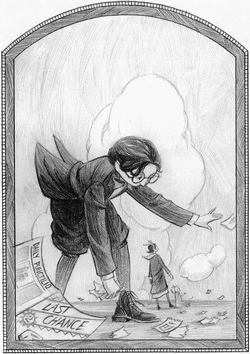
Final picture.
The last picture of The Vile Village shows Klaus in the foreground, trying to pick up the scraps of the Quagmires' commonplace books, and Violet and Sunny in the background, being blown about by the wind. A copy of The Daily Punctilio appears in the scene, with an ad for the Last Chance General Store.
Letter to the Editor
TO MY KIND EDITOR,
PLEASE EXCUSE THE WORD STOP AT THE END OF EVERY SENTENCE STOP. TELEGRAMS ARE THE QUICKEST WAY TO DELIVER A MESSAGE FROM THE LAST CHANCE GENERAL STORE, AND IN A TELEGRAM, STOP IS THE WAY TO SIGNAL WHEN A SENTENCE STOPS STOP.
THE NEXT TIME YOU ARE INVITED TO A PARTY, WEAR YOUR THIRD NICEST SUIT AND PRETEND TO NOTICE A SPOT STOP. THE NEXT DAY, TAKE THE SUIT TO THE DRY CLEANERS FOR CLEANING STOP. WHEN YOU COME TO PICK IT UP, YOU WILL RECEIVE INSTEAD A SHOPPING BAG CONTAINING MY ENTIRE ACCOUNT OF THE BAUDELAIRE CHILDREN'S EXPERIENCES IN THIS AREA ENTITLED "THE HOSTILE HOSPITAL" ALONG WITH AN INTERCOM SPEAKER, ONE OF THE LAMPS MISTAKENLY DELIVERED TO HAL, AND A HEART-SHAPED BALLOON THAT HAS POPPED STOP. I WILL ALSO INCLUDE A SKETCH OF THE KEY TO THE LIBRARY OF RECORDS, SO THAT MR. HELQUIST CAN ILLUSTRATE IT PROPERLY STOP.
REMEMBER, YOU ARE MY LAST HOPE THAT THE TALES OF THE BAUDELAIRE ORPHANS CAN FINALLY BE TOLD TO THE GENERAL PUBLIC STOP.
WITH ALL DUE RESPECT, LEMONY SNICKET
PS YOUR SUIT WILL BE MAILED TO YOU LATER STOP.
Reception
To be written.
Illustrations
Book editions
Several editions of The Vile Village have been published. Some of these include foreign editions or re-prints such as: The Vile Village (UK), The Vile Village (UK Paperback) and L'arbre aux Corbeaux.
The Vile Village (UK)
This edition has the same content as in the original one. The main difference here is the cover, which is black, has different fonts and a wine-red spine. Some colors in Brett Helquist's cover illustration were also changed. The book is published by Egmont. On each of the UK versions, between the colored spine and the black cover there are narrow images depicting a reference to the content of each book. The Vile Village features a row of feathers. This is repeated on the back cover.
The Vile Village (UK Paperback)
This is a paperback version of The Vile Village released in the UK by Egmont Books in 2010. It has Lemony Snicket written on the top with A Series of Unfortunate Events written below it in an eye shape.
L'arbre aux Corbeaux
This French edition, published by Nathan Poche has a very different cover, Brett Helquist's illustration is not seen here, apart for a portrait of the Baudelaires. It is almost entirely black, with a white illustration of a crow.


